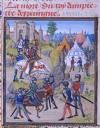
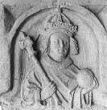



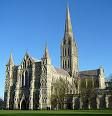

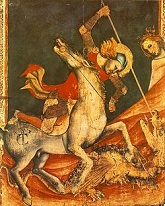
1350 World pop.: 300M; Rome: 30K-40K. The 140-year drought in Calif. (begun 1209) ends. The Black Death reaches Scotland and Wales after a Scottish army invades England and brings it back, and from there to Norway and Scandinavia; 20% of Scotland's pop. disappears within a year. About this time the Renaissance (It. "Rinascita" = rebirth) Period in Europe begins (ends 1650) as the intelligentsia begin to smell a rat in the divine pretensions of the Church and launch the timeless look at the ancient past called the Renaissance via their Greek scholar friends in Constantinople, no longer being satisfied with Arab translations but learning ancient Greek for themselves; meanwhile the workers see the class struggle clearly now, the rain is gone?; the Italian Renaissance begins first, spreading outward, with Italian Renaissance painting beginning about 1400, along with Italian Renaissance architecture, Italian Renaissance humanism, Italian Renaissance music, Italian Renaissance philosophy, and Italian Renaissance science; ironically, the decline of the Black Death leaves the Euro pop. mainly enthusiastic about Christianity, while the intelligentsia begin turning against it in the form of campaigns against superstition and idolatry; nobody wants to write thoughtful tomes probing the Black Death's meaning? On Feb. 14 the Treaty of Bautzen sees HRE Charles IV of Bohemia to cede Brandenburg and the Tirol (Tyrol) to the Wittelsbachs in return for their recognition of him. On Mar. 27 king (since 1312) Alfonso XI (b. 1311) dies of the plague while sieging Gibraltar, and his son Peter (Pedro) I (the Cruel) (1334-69) becomes king of Castile and Leon (until 1366), while his slightly older illegitimate half-brother Count Don Enrique (Henry) of Trastamara (Trastámara) (Henry II) (the Fratricide) (1334-79) begins plotting for the throne. The original gay eye for the straight guy? On Apr. 23 (St. George's Day) (1344-51?) Edward III formally institutes the Most Noble Order of the Garter (Order of St. George) in honor of the Holy Trinity, the Virgin Mary, St. Edward the Confessor, and St. George, with 25 knights plus the king as its permanent head, with members incl. the earl of Salisbury and Henry of Grosmont, all wearing a silly gilt-edged dark blue velvet ribbon with gold lettering on the left leg below the knee (the origin of the "blue-ribbon panel"); their motto is "Honi soit qui mal y pense" (Shame on anyone who thinks evil of it) (Evil to him who evil thinks), after the countess of Salisbury drops her garter at a dance and the king retrieves it, remarking you know what? (too chivalrous to put a mirror on their shoes?); St. George replaces Edward the Confessor as the patron saint of England; English is the only W European language in which knight doesn't mean horseman, the Anglo-Saxon word knecht meaning servant? In July Cola di Rienzi (Rienzo) (1313-54) of Rome reaches Prague and asks HRE Charles IV of Bohemia to help deliver Italy from the temporal power of the pope, but Charles IV arrests him and turns him over to Black Plague Pope Clement VI. On Aug. 11 the pact of the Holy League of the papacy, Venice, Cyprus, and the Hospitallers of Rhodes to defend Smyrna is renewed for 10 years, with an annual subsidy of 3K florins. On Aug. 22 Philip VI of France (b. 1293) dies, and on Sept. 26 his luxury-loving boob son (by his wife Jeanne of Burgundy), the duke of Normandy John (Jean) II the Good (1319-64) ("a good knight and a mediocre king") is crowned Valois king #2 of France in Notre Dame de Reims (until Apr. 8, 1364), and stages a royal entry into Paris on Nov. 11, going on to become a spendthrift and repeatedly debase the currency, appointing brutal thieves to administer his kingdom; on Nov. 19 popular constable of France Raoul II of Brienne, Count of Edu and Guines (b. 1315) is executed in Paris on the king's orders after being released by the English to seek his ransom and rumor to have pledges his county of Guines in return for his release, ending the king's honeymoon with his nobles. The Hook and Cod Wars begin in the county of Holland (end 1490) between the Cod faction (progressives) and the Hook faction (conservative noblemen). King Magnus Erikkson of Sweden establishes the Landslag (Land Law), establishing Sweden as an elective monarchy; replaced by the Civil Code of 1734. This is an Annus Mirabilis for the Roman Catholic Church, and many pilgrims visit Rome - bringing what with them? The Majapahit Empire in Java (1293-1527) reaches its cultural peak. A Jewish pogrom takes place in Duisburg, Germany. Tibet, led by Gyrates of Pham Drupe revolts from the Mongols and establishes sovereignty with a secular govt. About this time the Prostibulae Publica, licensed hos become common in Europe; by 1480 a prudish reaction begins driving them back underground. Trinity Hall college is founded at Cambridge U. by William Bateman (1298-1355), bishop of Norwich to replenish the priesthood after the Great Plague. In this half-cent. the Hawaiian Islands are settled by the Hokulea and the Hawai'iloa from the Polynesian islands? In this half-cent. the Maori Great Fleet (begun 950) comes to New Zealand in seven canoes from Hawaiki (Tahiti), forming groups of tribes called "waka", meaning "canoe"? In this half-cent. the Great Plague causes salt production to drop in N Europe, and the slack is taken up with inferior salt from Brittany; the demand causes salt deposits in Poland to be opened up, and Genoa eventually develops a monopoly in the Polish salt trade. The plague causes distilled spirits such as brandy and whiskey to be consumed in a vain attempt to ward off infection, inflicting Europe with an endless alcoholism problem to modern times? The Norse walrus-seal-hunting settlement at Disko Bay collapses due to colder climate and a rise in sea ice. Mohawk sachem (chief) Hiawatha (He Makes Rivers) and Huron sachem Deganawidah (Two River Currents Flowing Together) establish the Iroquois League of Nations, becoming the oldest functioning govt. in North Am. surviving into modern times. Italian lit. man Giovanni Boccaccio (1313-75) meets inspiring lit. man Petrarch (1304-74) while working on his chick lit. megahit The Decameron (1348-53). About this time the legendary ageless Prester John is believed to be based somewhere in Abyssinia (Ethopia); Zan is the royal title of Ethiopia, which has been Christian since the 4th cent. About this year the Great Vowel Shift in England begins (ends 1550). In this half-cent. English replaces French as the favorite language of English courtly lit.; English begins to supplant French in the English schools. The English word "always" is coined - when will alright be all right? In this half-cent. the Meistersinger movement begins in Germany. About this time Italian composer Giovanni da (Jovannes de) Cascia (Johannes de Florentia) (Giovanni da Firenze) thrives, composing cool madrigals. About this time Cambrai eclipses Paris as the center of French music. About this time lute-playing becomes popular in Europe. In Japan the shogun prohibits tea drinking. A serious shortage of yew wood for longbows causes Henry IV of England to order his royal bowyer to enter private land to cut it. Architecture: About this time English Perpendicular Gothic Architecture, which emphasizes long vertical lines, often with elaborate fan vaulting is invented (ends 1575). After three of its eight stories are rebuilt on a true vertical in an unsuccessful attempt to correct its center of gravity, the Leaning Tower of Pisa (begun 1174) is finally finished after 176 years. Edward III begins the rebuilding of Windsor Castle. About this time William Douglas, 1st Earl of Douglas (1323-84) builds tantalizingly cool Tantallon Castle on a cliff face opposite the Bass looking onto the Firth of Forth 3 mi. SE of North Berwick becoming the last medieval curtain wall castle built in Scotland. Palma Cathedral in Mallorca is begun on the site of an Arab mosque. Bergamo Cathedral in Italy is finished. Salisbury Cathedral in England is finished. Science: In this half-cent. English authorities regard mental illness as demonic possession, treating patients with exorcism and torture incl. hydrotherapy (ice-cold baths) and trepanation. Poetry: Thomas Chestre, Sir Launfaul; 1045-line Breton lay composed in this half-cent., based on the 538-line poem "Sir Landevale", which was based on Marie de France's Breton lay "Lanval". Nonfiction: The Yellow Book of Lecan is written about this time in Ireland; not to be confused with "The Great Book of Lecan" (1418). Art: Vitale da Bologna (1289-1369), St. George and the Dragon. Births: Spanish Dominican missionary (St.) Vincente Ferrer (d. 1419) on Jan. 23 in Valencia. French countess of Flanders and Burgundy Margaret III/II of Dampierre (d. 1405) on Apr. 13; daughter of Louis III of Male (1330-84) and Margaret of Brabant (daughter of Duke John III of Brabant); wife of Philip the Bold (1342-1404); mother of John the Fearless (1371-1419). Byzantine emperor (1391-1425) Manuel II Palaeologus (Palaiologos) (d. 1425) on June 27 in Constantinople; 2nd son of John V Palaeologus (1332-91) and Helena Kantakouzene (1333-96); almost loses Constantinople to the Turks until Tamerlane kicks their butts, giving him a 20-year respite. Russian prince of Moscow (1359-89) and Vladimir (1363-89) (St.) Dmitry (Dmitry) II Ivanovich Donskoi (Donskoy) ("of the Don") (d. 1389) on Oct. 12 in Moscow. Spanish king of Aragon (1387-96) John I (the Hunter) (the Lover of Elegance) (the Abandoned) (d. 1396) on Dec. 27 in Perpignan; eldest son of Peter IV (1319-87) and 3rd wife Eleanor (daughter of Peter II of Sicily). English archbishop of York (1398-1405) Richard le Scrope (d. 1405). Greek Byzantine statesman Manuel Chrysolorus (d. 1415); first successful teacher of ancient Greek in the West. English London mayor Dick Whittington (Wittington) (d. 1423) in Gloucestershire. Hindu mathematician-astronomer (discoverer of infinite series) ("Father of Mathematical Analysis") Madhava of Sangamagrama ("union village") (Irinjaatappilly Madhavan Namboodiri) (d. 1425) in Irinjalakkuda (near Cochin), India. Lithuanian grand duke (1392-1430) Vytautas (Witowt) (Witold) (the Great) (d. 1430); son of Prince Kiejstut of Samogitia; cousin of Ladislaus II Jagiello (1348-1434); uncle of Sigismund Korybut (1395-1435). Deaths: Spanish poet Juan Ruiz (b. 1283). Syrian Muslim scholar Ibn Qayyim al-Jawziyya (b. 1292) on Sept. 23. French Valois king (1328-50) Philip VI (b. 1293) on Aug. 12. French duke of Burgundy (1315-50) Eudes IV (b. 1295) on Apr. 3 in Sens. French count of Eu and Guines Raoul II of Brienne (b. 1315) on Nov. 19 in Paris (executed). German controversial talk radio host Till Eulenspiegel (b. 1350) in Molln (near Luneburg) (plague). Spanish Castilian king Alfonso XI (b. ?) on Mar. 27 in Gibraltar (plague).


1351 The Black Death (begun 1347) reaches Russia, but suddenly begins to decline after 25M-75M are killed throughout Europe; the new reduced pop. mix leads to political and social upheavals, incl. the enclosure of land for sheep raising, accumulation of great fortunes (causing the baronage to lose status), an increase of uppityness of the yeomanry, and an increase in conspicuous consumption (bigger houses, etc.)? On Mar. 20 sultan (since Feb. 1, 1325) Muhammad bin Tughluq (Mohammed Tughlak) (b. 1290) dies, and Firoz Shah Tughlaq (1309-88)) becomes sultan of Delhi (until Sept. 20, 1388), watching the internal turmoil go from bad to worse. On Aug. 15 Louis I of Hungary makes a peace agreement with grand duke Kestutis of Lithuania, in exchange for accepting Christianity and providing Hungary with military aid, but after a pagan ritual supposedly to pacify the other side Kestutis reneges. On Nov. 6 in an effort to win back the support of his nobles, John II of France issues a circular letter announcing the Order of the Star, inviting French noblemen to join this new emasculated reincarnation of the Knights Templar. Zurich joins the Swiss Confederation (League). On Dec. 25 William Boy (Gael. "bui" = golden-haired) O'Kelly of Ui Maine begins the greatest feast in Irish history, inviting all the learned and entertainers of Ireland to his castle at Galey on the shores of the Lough Ree for a whole month, causing the saying "the welcome of the O'Kellys" to be coined. Einsbeck in S Lower Saxony, Germany begins exporting its strong lager beer, joining the Hanseatic League in 1368 and making fans of the dukes of Wittelsbach in Munich, Bavaria, who mispronounce the name as "ein bock" (billy goat) and clone it in their ducal brewhouse, becoming known as Bock style beer. Erfurt in Thuringia, Germany passes a burdensome ordinance regulating beer; "A calibrated tankard must always be filled to the mark. The beer in it shall cost 4-1/2 pfennigs and 8 groschen. No burgher or councilor may brew more than two beers per year, nor may he make half a brew, nor may he mill less or more than three boxes of malt to brew with. Only on Wednesday evening, and not before the beer bell is rung, may he start a fire under the tun and start brewing. But nobody may brew who does not possess containers, tuns, kilns and casks. The beer must be an entire brew. The amount to be brewed must be announced on Walpurgis Day (Feb. 25), and the precise amount announced must then be brewed. Nobody may brew with straw and twigs for fire. Anybody who breaks an innkeeper's beer mug or runs away without paying, will pay a 10-groschen penalty or must leave town. Anybody who buys hops may not touch the measuring jar until the vendor has filled it and has removed his hand from it. In the countryside, nobody may sell beer from another region nor may he brew without the knowledge of the town. Any burgher caught brewing in the countryside will no longer be considered a burgher of the town." There is massive flooding of the Yellow River in China; Liu Futong leads the rebel Red Turban Army in Yin Zhou (created by Guo Zixing from followers of the White Lotus in response to the Black Death) in a successful rebellion against the Mongol Yuan Dynasty (ends 1368). Gongmin (1330-74), 2nd son of King Chongsuk becomes king of Goryeo (Korea) (until 1374), becoming known for his ardent love affairs with young boys. The Thai Ayutthaya Kingdom of Siam (ends 1767), with capital at Ayuthia (Ayutthaya) (Ayudhya) is founded by Rama Tiboti (Ramathibodi) I (1314-69), with both Hinayana Buddhist and Chinese political institutions, launching a cent.-long invasion of Cambodia. The Statute of Labourers, passed under Edward III attempts to keep the wages and prices as low in England as they had been before the Great Plague created a labor shortage; every workman not bound to a lord or exercising a craft is required to take work when offered to him, and at the pre-plague "just price"; despite a host of jury-rigging, the law is widely flouted, causing many lords to lease their demeanes to tenant farmers, creating a new prosperous working class which keeps wanting mo' and mo'? The English Statute of Provisors of Benefices is passed to attempt to stem the influx of foreign clergy under control of the Avignon popes by restricting the power to make appointments to ecclesiastical offices; it is widely ignored. Louis I the Great passes the Jus Aviticum, restricting the freedom of the "little kings" of Hungary to dispose of their property. The Jolof (Wolof) (Wollof) Empire in Senegal is founded; in 1549 its vassal states break free, turning it into the rump Jolof Kingdom, which is conquered in 1875 by the Muslim Imamate of Futa Jallon in modern-day Guinea (1725-1896) before being incorporated into French West Africa in 1890. Greek polymath historian Nicephoras Gregoras (-1360), leader of the anti-Hesychasts is condemned by a church council in Constantinople and placed under house arrest, and the mysticism-loving Hesychasts dominate the Greek Orthodox Church, causing the Aristotelian rationalist anti-Hesychasts to give up on it and turn to the West. Jeanne de Bar resigns (is deposed?), returning to England in 1353, and Jean de Saint-Clair (1329-66) (whose grandfather is married to her aunt) becomes grandmaster of the Priory of Sion (until 1366) :). Sports: After the horrible Black Death of 1347-50 passes, tennis becomes an open air game in England - now that the air is cleared, the perfect game, where love means nothing? Architecture: Notre Dame Cathedral in Paris is finished. Inventions: An automaton called Maurizio, which strikes the hours with a hammer is installed in the Cathedral of Orvieto in Spain. Nonfiction: Anon., The Laurentian Sea Atlas (Florence); has a good map of the coast of Africa. Petrarch (1304-74), Epistle to Posterity (autobio.); Africa; based on Roman gen. Scipio Africanus. Births: Austrian Hapsburg duke (1365-86) Leopold III of Steiermark (d. 1386) on Nov. 1 in Vienna; son of Albert II (1298-1358); younger brother of Rudolf IV the Founder (1339-65) and Albert III (1349-95); father of William the Ambitious (1370-1406), Leopold IV (1371-1411), Ernest the Iron (1377-1424), and Frederick IV (1382-1439). Italian duke #1 of Milan (1395-1402) Gian Galeazzo Visconti (d. 1402) in Nov.; son of Galeazzo II Visconti (1320-78) and Bianca di Savoia. Polish king (1386-1434) and Lithuanian grand duke (1377-1401) Wladyslaw II Jagiello (Jogaila) (d. 1434) in Vilnius; son of Olgerd (Algirdas) (1296-1377) and 2nd wife Uliana; last pagan ruler of Lithuania, who converts to Roman Catholicism in 1386; founder of the Jagiellon Branch of the Gediminids Dynasty, which rules both states until 1572; father of Jadwiga of Lithuania (1408-31). Lithuanian grand duke (1432-40) Sigismund I Kestutian (Kestutaitis) (d. 1440) (b. 1365?); son of grand duke Kestutis (1297-1382) and 2nd wife Birute; born pagan, then baptized Roman Catholic in 1383 when daddy can't stop him? Deaths: Indian sultan of Delhi (1325-51) Muhammad bin Tughluq (b. 1290) on Mar. 20.

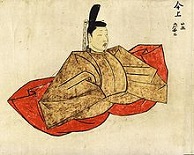

1352 On Jan. 5-6 the Order of the Star, founded the previous year by King John II of France holds its first and only meeting, and proves a flop - King John is no King Arthur? In Feb. David II is allowed to attend the Scottish parliament on parole to argue for John of Gaunt or some other son of Edward III being named heir presumptive to the Scottish throne ahead of Robert Stewart, but is laughed off. On Sept. 25 Go-Kogon (1338-74) (personal name Iyahito), 2nd son of Kogon becomes Japanese Ashikaga (northern) pretender emperor #4 (until Apr. 9, 1371). On Dec. 6 (Thur.) Pope (since 1342) Clement VI (b. 1291) dies with his precious Smyrna still in Latin hands, which it stays for 50 years (until Dec. 1402), and on Dec. 18 Limousin canonist Etienne Aubert, cardinal-bishop of Ostia and Velletri is elected Pope (#198) Innocent VI (-1362), going on to reform the Dominicans and frantically try to round up support for the war against the Muslim Turks, who are raiding the E Mediterranean and harassing pilgrims; next spring Clement VI is given a majestic funeral cortege from Avignon to the Benedictine Abbey of Chaise Deu, where he is buried on Apr. 8, 1353 in a black-white marble tomb on top of a black marble table surrounded by 54 small statues of his relatives (all given high church offices by himself); 50 priests say Mass for him for nine days, after which it is generally agreed that this won't be nearly enough to save his dissolute and sinful soul from Hell? The French town of Guines surrenders to the English. Prince Dragos arrives from mountainous N Transylvania, and founds Moldavia. The cantons of Glarus (E of Schwyz in the Linth valley) and Zug (W of Schwyz) join the Swiss Confederation. Cola di Rienzi is extradited to Rome. The Ottomans establish a bridgehead on the Gallipoli Peninsula at Tzympe. Giovanni Visconti of landlocked Milan annexes seafaring Genoa, ancient enemy of Venice - can I keep it? S Chinese peasant (former Buddhist monk) Zhu Yuanzhang (Yuan Zhang) (Chu Yuan-chang) (1328-98) launches a rebellion against the Chinese Mongol govt. (ends 1368). The English Statute of Treason of 1351 defines treason legally for the first time, surprise, basically anything encompassing the death of the king or violation of the queen. Roger Mortimer, 2nd earl of March gets the English Parliament to reverse the judgment on his grandfather and grant him his title and lands. Arab geographer Ibn Battuta (1304-69) explores the Sahara Desert - there ain't no bugs on me? Corpus Christi College ("House of Scholars of Corpus Christi and the Blessed Virgin Mary") is founded in Cambridge, England by the guilds of the Blessed Virgin Mary and Corpus Christi, becoming the only college founded by Cambridge townspeople; it later becomes known as St. Benet's for its chapel; its members incl. 13 fellows, 6 scholars, and 24 scholarship holders, and it goes on to produce prelate Matthew Parker et al.; Oxford's Corpus Christi College is not founded until 1516. Architecture: The Church of Santa Maria Incoronata in Naples near Castel Nuovo is begun by Charles II of Anjou (finished 1373), opening in 1364 to house an alleged spine from Christ's crown of thorns requested by Joanna I of Naples from Charles V of France. Art: Tommaso de Modena paints the first artistic representation of eyeglasses. Births: German Wittelsbach king and HRE (1400-10) Rupert (Ruprecht) III of the Palatinate (d. 1410) on May 5 in Amberg; son of Rupert II (1325-98) and Beatrix of Sicily. English nobleman-soldier Edmund Mortimer, 3rd Earl of March (d. 1381); son of Roger Mortimer, 2nd earl of March (1328-60) and Philippa, daughter of William Montagu, 1st earl of Salisbury. Deaths: Ethiopian religious leader Ewostatewos (b. 1273) on Sept. 15 in Armenia. French philosopher Jean de Muris (b. 1290).





1353 On Jan. 19 after reps from the Byzantine city of Philadelphia in Anatolia beg the Avignon pope for aid against the "incessant and inhuman" attacks of the Turks, promosing to turn their city over to the Holy See, Pope Innocent VI tells them that they first have to agree to give up their allegiance to the Orthodox Church, abjure their "ancient schism", and unite with the Latin Church, and sends them packing for further instructions; meanwhile on Apr. 1 he writes a letter to Hugh IV of Cyprus telling him to aid John VI Cantacuzene in his professsed goal of uniting the Greek and Roman churches, despite his questionable sincerity; on Nov. 28 the pope requests Pedro IV of Aragon and Genoa to allow two ships loaded with papal provisions for Smyrna to be given safe passage. On Apr. 27 grand duke (since Mar. 31, 1340) Simeon the Proud (b. 1316) dies of the plague after taking monastic vows, and on Apr. 27 his son Ivan II Krasny (the Beautiful) (1326-59) becomes grand duke (prince) of Moscow (until Nov. 13, 1359); his rule is dominated by his ministers, who seek to preserve the territorial gains of his father - imperialism is the essence of Russia? Five consonants in a row? Stephen Kotromanic dies, and his nephew Tvrtko I (-1391) becomes ruler of Bosnia, which reaches its maximum size and power. Giovanni Visconti (d. 1354) annexes Novara, and begins the Genoan-Venetian War (ends 1355) (1350-81?) to challenge Venice's dominance of the Adriatic trade. The German-speaking canton of Berne (Bern) in WC Switzerland joins the Swiss Confederation, thereby completing the "eight old locations"; Switzerland is established. Hesychast monk (metropolitan of Heraclea) Philotheos Kokkinos ("the redhead") (1300-78) becomes patriarch of Constantinople (until 1354, then 1364-76). The English Statute of Praemunire forbids appeals to courts outside England, particularly hated Avignon; it is widely ignored. William Douglas (1327-84) kills Sir William Douglas of Liddesdale (b. 1300), "the Flower of Chivalry" in Ettrick Forest after the latter loses the king's favor by permitting English troops to pass through Liddesdale unhindered; after marrying Margaret, daughter of Earl Thomas of Mar (1332-74), in 1357, he is created the 1st Earl of Douglas in 1358, and later becomes earl of Mar when Thomas dies without a male heir, ending his ancient Gaelic line. After the primacy dispute of the archbishops of Dublin and Armagh is referred to him, Pope Innocent VI rules that "Each of these prelates should be Primate; while, for the distinction of style, the Primate of Armagh should entitle himself Primate of All Ireland, but the Metropolitan of Dublin should subscribe himself Primate of Ireland." The mysterious 14 ft. 3 in. x 3 ft. 7 in. Shroud of Christ (Turin) first emerges in the possession of French knight Count Geoffroi de Charny (1300-1356) of Lirey, France, who owns it equally with his new wife, descended from Knights Templar Robert de Clare (leader of the Fourth Crusade)?; in 1390 he presents it to Bishop Pierre d'Arcis, dean of the Lirey Abbey, who writes to Pope Clement VII, calling it a forgery whose artist confessed; in 1413 the Charnys' descendent Marguerite reclaims it despite threats of excommunication; what does this mysterious dude have to do with Knights Templar deputy Geoffroi de Charnay (-1314), roasted in 1314, his descendant? Births: Danish-Norwegian-Swedish queen ("the lady king") ("the Semiramis of the North") Margaret (Margreta) of Denmark (d. 1412) in Vordingborg Castle; 2nd daughter of Valdemar IV of Denmark (1320-75); wife of Haakon VI of Norway (1340-80). English archbishop of Canterbury (1397, 1397-1414) Thomas Arundel (d. 1414). Deaths: Scottish knight Sir William Douglas of Liddesdale (b. 1300). French philosopher Nicholas d'Autrecourt.
1354 In Mar. after an earthquake causes the pop. to evacuate it, the Ottomans seize and fortify Gallipoli (Callipolis), the last Byzantine possession in Anatolia (until 1366), and first cross the Hellespont (Dardanelles) into Europe, raiding N into Thrace, with the news causing a panic at the disco in Constantinople. On Aug. 1 Cola di Rienzi returns to Rome in triumph as senator of Rome, but his excesses cause a mob to kill him on Oct. 8. On Oct. 5 Giovanni Visconti (b. ?) dies, and his nephews Matteo II, Bernabo, and Galeazzo II divide and rule the domains jointly while plotting to stab each other in the back; Matteo gets Lodi, Piacenza, Parma and Bologna; Bernabo gets the E side (Bergamo, Brescia, Cremona, Crema); Matteo and Galeazzo become known for harsh rule and ostentatious patronage of learning and art, with Galeazzo backing Plutarch and founding the U. of Pavia in 1361. On Nov. 4 the Genoans under Paganino Dona destroy the Venetian fleet under Niccolo Pisani in the naval Battle of Sapienza (Porto-Longo) (Zonklon) off the Peloponnesus, sinking or capturing 35 Venetian galleys and taking 5K POWs, causing a peace to be mediated by Milan next year. On Nov. 22 with Genoese support, John V Palaeologus drives his Turk-appeasing Byzantine usurper John VI Cantacuzene (d. 1383) to abdicate and enter a monastery, where he goes back to being a brain man and writes the 4-vol. History of the Byzantine Empire from 1320-56; Philotheos is deposed, and Callistos (-1363) becomes patriarch of Constantinople, offering a "metropolitan of the Lithuanians" to grand prince Olgerd (Algirdas) (-1377), who picks Roman of Tver (-1362), who sets up shop in Kiev as a rival of Alexis until his death; Genoese adventurer Francesco I Gattilusio (-1384), whose help was instrumental marries John V's sister Maria Palaeologina and receives lordship of the lovely isle of Lesbos, starting a Lesbian daisy chain leading to Prince Rainier of Monaco, the Marquis de Sade, and Brooke Shields? :) Giovanni Boccaccio is sent to the papal court at Avignon. Robert Stewart gets the Scottish parliament to reject plans to ransom David II for 90K marks and 20 noble hostages, and instead convinces them to invade N England next year. Muslim mobs in Cairo, Egypt plunder and demolish several Christian churches incl. the Church of Fahhadin, a Church in Bataq al-Tokruni, and the Convent of Nehya in Djizah. Muslim explorer Ibn Battuta (1304-77) finishes his explorations, going on to write Rihla (Journey). Inventions: A mechanical clock is constructed for Strasbourg Cathedral. Architecture: The Alhambra in Granada, Spain (begun 1248) is finished. Nonfiction: Anon., Ordinance of the Jews of the Crown of Aragon. Demetrius Cydones (1324-98), Greek Trans. of Thomas Aquinas' 'Summa Contra Gentiles' (Dec. 24) (3 p.m.); big hit with ex-Byzantine emperor John VI Cantacuzene, who goes on to trans. many Latin theologians into Greek, incl. Aquinas and St. Augustine of Hippo. Deaths: Italian patriot Cola di Rienzi (b. 1313) on Oct. 8 in Rome; killed by a mob after tying to sneak out in disguise.
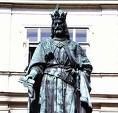
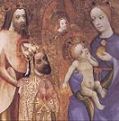
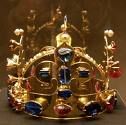






1355 On Jan. 6 Bohemian king (since Aug. 26, 1346) Charles IV of Luxembourg (1316-78) is crowned king of Italy, followed on Apr. 5 by HRE in Rome (until Nov. 29, 1378) by a papal legate sent from Avignon, ending years of conflict between popes and emperors over control of Italy and the papacy (now that half of the pop. is dead?), and allowing Charles to give Bohemia its golden age; his obscenely jeweled Bohemian Crown of St. Wenceslas has a nice little cross on top; he appoints U. of Perugia law prof. Bartolus de Saxoferrato (1313-57) as his consiliarius, who goes on to leave a large number of key works on Roman law that cause his opinions to be followed whenever Roman source texts are silent, and the saying "Nemo bonus iurista nisi bartolista" (No one is a good jurist unless he is a follower of Bartolus) to be coined. In the spring the Black Plague tames down, and England and France return to their morbidly obese warry war war war; Edward of Woodstock (1330-76), prince of Wales since 1343 is appointed the king's lt. in Gascony, going on to stage a series of raids across S France, pillaging and destroying Carcassonne and capturing Bordeaux, then using it as a base for a triple attack on Brittany over the Channel and from inland, accomplishing little; meanwhile the French govt. collapses financially, causing the estates of Languedoc and Langue d'Oïl (d'Oil) to get the work to get the Great Ordinance of 1357 passed, forcing the king to consult them before making new levies of money and to allow supervision of their collection and expenditure by a commission from the estates; John II the Good Fellow cleverly tricks the states into adjourning, then debases the coinage and organizes an opposition. On Apr. 17 after Milan mediates a peace between Venice and Genoa, and he attempts a coup with the intention of declaring himself prince, Doge Marino Faliero (Marin Falier) (b. 1285) is executed in Venice, and his body mutilated; meanwhile after an 8-year truce war breaks out between Venice and Hungary over control of the Dalmatian coast. On May 6 after his first wife Elizabeth Mure (Muir) dies, Robert Stewart marries Euphemia de Ross (1325-86), sister of Earl William of Ross, and widow of Earl John Randolph of Moray; in 1371 aftr a dispensation by Pope Innocent VI she becomes queen consort of Scotland (until 1386); they go on to have children David Stewart, 1st Earl of Caithness (-1388), Walter Stewart, 1st Earl of Atholl (-1437), Egidia Stewart, and Elizabeth Stewart. In May Count Henry of Trastamara kills 1.2K Jews in Toledo, Spain - I like myself the way I am? In Aug. the Scots invade N England and decisively defeat the English at the Battle of Nesbit Moor. On Sept. 29 Matteo II Visconti (b. 1319), imperial vicar of Milan since 1349 is assassinated (poisoned) by his brothers and co-rulers Bernabo and Galeazzo II. On Dec. 15 after the Ottomans isolate Constantinople from Europe, Byzantine emperor John V Palaeologus, after consultation with Roman Catholic archbishop Paulus of Smyrna signs a golden bull promising to secure the obedience of the Greek Orthodox Church to the Holy See in Avignon in return for military aid in the form of five galleys, 15 transports, 500 horse and 1K infantry for 6 mo., during which time he will make Latin Catholicism the official Byzantine religion, start bldg. a palace and church for a papal legate, and establish three Latin colleges for the promotion of Latin culture and language they da boss now, Roman emperor Constantine was right all along?); meanwhile on Dec. 20 Serbian czar (hero king) Stephen Dushan (Stefan Uros IV Dushan) (b. 1308) dies while marching on Constantinople, which is both good and bad, as it takes care of an enemy while making Constantinople's situation worse as his empire disintegrates and can't stop Ottoman expansion either; meanwhile Pope Innocent VI sends the Hospitallers a scorching letter about their shameful laziness and luxury and failure to take on the pesky Turks, threatening to take their resources "rusting in Rhodes" and give them to a new military order if they don't show good faith by moving their convent to mainland Anatolia. Giovanni Boccaccio revisits Naples. King Magnus of Norway-Sweden orders Norwegian sea capt. Paul Knutson to journey to Greenland to restore the Christian faith among the Norsemen still living there. Perpendicular Gothic church cloisters are developed in England. Architecture: St. Mary's Church in Nuremberg is begun. Art: Taddeo Gaddi (1300-66), Madonna and Child (Uffizi, Florence). Novels: Giovanni Boccaccio (1313-75), Il Corbaccio (prose romance). Births: English concert promoter, er, royal heir Thomas of Woodstock, 1st Duke of Gloucester, 1st Earl of Buckingham, 1st Earl of Exxex, Duke of Aumale (d. 1397) on Jan. 7 in Woodstock Palace, Oxfordshire; 7th son and 14th (youngest) child of Edward III (1312-77) and Philippa of Hainault (1314-69). Scottish rhyming chronicler Andrew Wyntoun (d. 1422). Greek Neoplatonist philosopher Georgius (George) Gemistus (Gemistos) (Pletho) (Plethon) (d. 1452) in Constantinople; teacher of Johannes Bessarion (1395-1472); big fan of Plato, causing him to name himself after him, and go on to help introduce him to Italy, advocating a return to the Olympian gods; settles in Mistra near the site of ancient Sparta in the Peloponnesus, becoming a big enemy of pro-Aristotle Patriarch Gennadius II - I love my career, or should I say careers? Deaths: French philosopher John de Murs (b. 1290). English bishop William Bateman (b. ?) on Jan. 6 in Avignon, France (Festival of Epiphany) (poisoned?). Serbian king (1331-46) and emperor (1346-55) Stephen Dushan (b. 1308) on Dec. 20 in Devoll. Portuguese throne babe Indes de Castro (b. 1325) on Jan. 7 in Coimbra (murdered on the orders of her hubby Peter I's father Alonso IV).
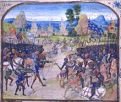

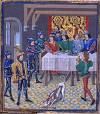

1356 On Jan. 10 Rupert I "the Red" (1316-90) becomes Palatine elector (until Feb. 16 1390). In Jan. Edward Balliol resigns his claim to the Scottish throne to Edward III at Roxburgh Castle in return for a large pension, and spends his last years in Yorkshire (until 1364); an English army leaves Roxburgh Castle to raid Scotland, but is ambushed in Ettrick Forest by Black Douglas' nephew William Douglas, 1st Earl of Douglas (1327-84), who "slew great numbers", causing a reserve army to be sent to reinforce the castle. On Mar. 25 Edward III signs a truce with the Scots, set to last until Michaelmas (Sept. 29), allowing William Douglas to travel to France with a retinue incl. his cousin "Black" Archibald Douglas the Grim, 3rd Earl of Douglas (1328-1400), and join the French army to support the Auld Alliance, giving the excuse that they didn't want their horses' harnesses to rust; go figure, William tells French king John II the Good that it would be better for the knights to dismount and fight on foot, dooming the French cause? - leave it to a Scot to stick his foot in his mouth? On July 21 Pope Innocent VI sends Carmelite bishop Pierre Thomas, of Patti, Sicily (who had just spent a year trying in vain to get Stephen Dushan to give up Serbian Orthodoxy) with a reply to the golden bull of Byzantine emperor John V Palaeologus, eagerly agreeing to its terms, although he knows he can't really send substantial military assistance against the Turks because all available troops are already occupied at precious Smyrna, and John knows he can't really get his subjects to convert to Latin Catholicism - listen to me, I need you? The English kick Frogg tin can butt and the pope sets aspiring German kaisers back? On Sept. 19 although outnumbered 3-1, the English under "model of chivalry" (who becomes a big hero afterward) Edward the Black Prince (1330-76) utilize the tactics of Crecy (1346) and rout the French army (which incl. some Scots), led by the "last chivalrous king of France" at the Battle of Poitiers; "true and perfect knight" Count Geoffroi de Charny (b. 1300) is KIA; King John II the Good of France and his son Philip are captured, along with the king of Bohemia and Black Archibald (who escapes after Sir William Ramsay of Coulluthie tricks the guards with the old fake fight trick), and the flower of French cavalry and taken captive to England, although Philip shows such courage that he earns the name "Philip the Bold"; his other son, 18-y.-o. Dauphin Charles (later Charles V), duke of Normandy and dauphin of Viennois acts as regent, summoning the Three Estates in Oct. to deal with the civil chaos, and together they scheme for the release of his brother-in-law Charles II the Bad, King of Navarre (1332-87) (son of Louis X's daughter Jeanne, who therefore has a better claim on the French throne than Edward III), who is being held in prison for his endless intrigues; Edward II's 61-y.-o. niece Jeanne de Bar (1295-1361) is allowed to visit and "comfort" John II, becoming his mistress. They call me mister big hot pastrami? After the lessons of centuries of crapola finally wise him up, HRE Charles IV issues the Golden Bull of 1356, laying down the rules for imperial succession for the next four cents. (until 1806), and permanently ending papal interference in the Holy Roman Empire by eliminating the need for papal approval and confirmation of German kings and emperors, creating seven hereditary (by primogeniture) indivisible electors (the archbishops of Mainz, Trier, and Cologne, the count palatinate of the Rhine, the duke of Saxony, the margrave of Brandenburg, and the king of Bohemia), with the HRE to be elected by a majority vote (but limited to the house of Luxembourg) without delays; it also requires each new HRE to hold his first diet in Nuremberg after his election, and gives the electors supervisory powers over the empire, turning it from a monarchy into an aristocratic federation, with Charles IV openly calling the empire an anachronism but valuing the HRE's right to nominate to vacant fiefs; too bad, it "codifies anarchy and calls it a constitution", making pan-German kingship an impossibility and insuring a disunited Germany until the time of Bismarck, although Charles IV himself is personal ruler of all the kingdoms in the HRE by 1365. The English duke of Lancaster sieges Rennes, and the forces of Duke Charles de Blois of Brittany, led by Bertrand du Guesclin relieve it and help it hold out against the English. Buddhist rebels capture Nanjing. The Mongols under Jani Beg invade Azerbaijan and take the city of Tabriz, establishing their own gov. Edward de Baliol retires on an English pension after surrending his title of Scottish king to Edward III. King Magnus turns over the kingdom of Norway to his son Haakon VI Magnusson (1340-80) (until 1380). Brandenburg is recognized by HRE Charles IV as one of the seven imperial electorates. The Hanseatic League holds its first gen. Diet in Lubeck, growing to 170 cities and dominating Baltic maritime trade until 1800, incl. beer. Paul Knutson leads an expedition from Greenland to Vinland (Newport, R.I.), constructing a tower that survives to modern times, and erecting the Kensington Runestone, with Norse runes carved on its surface, in central Minn.?; Knutson and most of his men die in the New World, and the only survivors return to Norway in 1364?; Norse expansion into the New World ends as a result of drought? Nonfiction: Jean de Roquetaillaide (-1366), Liber Ostensor; Guide to the Tribulation; French Franciscan predicts the Big Date for the return of the Antichrist as 1366, to be followed in 1369-70 by a millennial Sabbath, in which Jerusalem will get a king again and rule the world. Births: Spanish king of Aragon, Valencia, Sardinia and Corisca, count of Barcelona (1396-1410), and king of Sicily (1409-10) Martin I (the Elder) (the Humane) (the Ecclesiastic) (d. 1410) on July 29 in Girona (Perpignan?); 2nd son of Peter IV (1319-87) and Eleanor of Sicily; last ruler of the House of Barcelona (founded 870). Deaths: French "true and perfect knight" Count Geoffroi de Charny (b 1300) on Sept. 19 in Poitiers; KIA in the Battle of Poitiers.
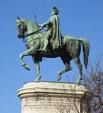
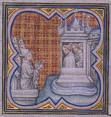





1357 The Estates reach their peak of power in France under Etienne Marcel and Big Bob Le Cock? In Feb.-Mar. after backing by Etienne Marcel, the Estates-Gen. issue the Grand (Great) Ordinance of 1357, a sweeping reform of the French monarchy and govt., providing for a standing committee to supervise levy and expenditure of taxes, poor relief, and other reforms, without attempting to mess with the traditional powers of the monarchy; they force Dauphin Charles to sign it as regent of France; in May King John II repudiates it, and the Marcel-Le Coq Revolt, led by Etienne Marcel (-1358) and Bishop (of Laon)Robert Le Coq (-1373) of Laon begins against Dauphin Charles in Paris, with Marcel's Great Ordinance of 1357 setting limits on the French monarchy, causing him to flee and gather a powerful coalition; meanwhile Marcel stinks up the rebellion by allying with bad bad Charles the Bad of Navarre. On Mar. 23 the 10-year Truce of Bordeaux ends the English invasion of France; too bad, the negotiations are transferred to England, and the treaty never ratified; one of the terms is that the siege of Rennes by the English be lifted, but the duke of Lancaster continues until they buy him off in July; the discharged English mercenaries turn into highwaymen in the Rhone Valley et al. In Apr. after papal legate Pierre Thomas spends 5 mo. trying in vain to end their war on his way to Constantinople, the Venetian-Hungarian war resumes, and after Hungarian Vs the Venetians cut off their 3K annual contribution for the defense of Smyrna, giving the quaking Byzantines more bad news. On May 28 king (since Jan. 7, 1325) Alfonso IV (b. 1291) dies after ordering the execution of his son Pedro's female lover, Castilian princess Ines de Castro, and his son Pedro I (the Just) (the Cruel) (1320-67) becomes king #8 of Portugal (until Jan. 18, 1367), immediately avenging her death by justly having the hearts torn out of her assassins and later (summer 1360) making the court justly do obeisance to her skeleton and justly kiss the hand of her corpse seated on the throne. In Oct. 33-y.-o. David III finally returns to Scotland after 11 years (1346), having developed "a rycht gret specialtie" of friendship with Edward III, who invites him to tournaments of the new Order of the Garter; the release happens after the Scottish parliament, no longer able to rely on the French finally folds and agrees to a ransom of 100K marks to be paid over 10 years, plus hostages and a long truce; Robert Stewart the Steward remains heir presumptive. On Nov. 7 Byzantine emperor John V Palaeologus sends papal envoy Pierre Thomas back to Avignon with a letter kissing up to the pope, noting that Michael VIII (the first Palaeologian emperor) had done it, so he could too, with the soundbyte "I shall keep the faith and fidelity to my lord the supreme pontiff, as do the other princes in the Roman Church", promising to depose anti-Latin Constantinople patriarch Callistus, and ending with the kicker "I know that if your legate comes with galleys and the aid I seek, all will submit and be loyal to you". In Nov. Charles of Navarre escapes from prison in Picardy. Jani Beg is assassinated, and Berdi Beg (Berdibek) (-1359) becomes khan of the Mongol Golden Horde (until 1359). The Ispah (Persian Sepoy) Rebellion (ends 1366) in Fujian, China sees a Mongol army of mainly Arab and Persian Muslims revolt against the Yuan Dynasty, occupying Quanzhou (Chinchew) (Zaiton) on the SE coast of China beside the Taiwan Strait, alng with Putian, threatening Fuzhou until it collapses in 1362 and is crushed by Han Chinese cmdr. Chen Youding. Tsongkapa (Tsongkhapa) (-1419) ("man from Onion Valley"), the first Buddhist Dalai Lama ("Great Ocean") is born in Tibet, receiving the name Lobsang Drakpa (Je Rinpoche) and founding his first monastery in 1409; all following ones are supposed to be his reincarnations. The town of Hoorn in North Holland 20 mi. N of Amsterdam acquires city rights. A law is passed in England forbidding waste from being thrown into the Thames or other waterway under threat of imprisonment and fines, adding new professions to the city payroll incl. muckrakers, bin men, and gong farmers (drain cleaners). Meet the Fuggers? The Fugger Family starts out with Hans, who arrives in the Swabian free city of Augsburg, after which weaver Johann Fugger founds a trading co. in 1367. Sports: The Kirkpinar Oil Wrestling Festival is inaugurated in the Ottoman region of Rumelia (S Balkans), becoming the oldest continuously-sanctioned sports competition in the world. Architecture: The Bastille (originally Bastille Saint-Antoine Castle) is built to protect the strategic gateway of the Port Saint-Antoine on the E side of Paris from the pesky English; construction drags along until the 1370s; in 1417 it becomes a state prison; Louis XIV uses it to imprison nobles and Huguenots; by 1789 it houses 5,279 prisoners, some of whom write autobios. complaining of bad conditions, causing reforms to be implemented and the prison pop. to be considerably reduced by the time of the July 14, 1789 Bastille Day. After the Judith Bridge (built 1158-72) is damaged by a flood in 1342, the 546-yd.-long (1,693-ft.-long) 33-ft.-wide sandstone bow Charles Bridge (originally Prague or Stone Bridge until 1870) over the Vltava River in picturesque Prague, Czech. is begun by Charles IV (fnished in 1402), built on the sides of the Moldau River Valley with the river running funkily through it, becoming the only bridge crossing the Vltava River until 1841, making Prague into an important trade route between E and W Europe; the cool look causes eight more bridges to be built over the river? Etienne Marcel purchases the Maison aux Piliers (House of Pillars) in the 4th arrondissement of Paris on the future Place de Greve (Square of the Strand), and rebuilds it with financial aid from Francis I into the Renaissance-style Hotel de Ville (Fr. "City Hall"), moving the city admin. there from the Parlor of Burgesses near the Chatelet; the bldg., designed by red-bearded Dominique de Cortone "il Boccador" of Italy and Pierre Chambiges of France is not finished until 1628, and burns down in 1871. Births: Portuguese king #10 (1383-1433) and 1st Lord of Ceuta Joao (John) I (the Great) (the Good) (the Happy Memory) (the Bastard) (d. 1433) on Apr. 11 in Lisbon; illegitimate son of Pedro I and Teresa Lourenco; half-brother of Ferdinand I (1345-83); husband (1387-) of Philippa of Lancaster (1360-1415) (daughter of John of Gaunt); father of Duarte (Edward) I (1391-1438), Duke Peter of Coimbra (1392-1449), Isabella of Portugal, Duchess of Burgundy (1397-1471), Infante John (1400-42), and Ferdinand the Holy Prince (1402-43). Korean Chosun Dynasty king #2 (1398-1400) Jeongjong (Yi Bang-gwa) (d. 1419) on July 18; 2nd son of Taejo (1335-1408). German Minnesinger poet Hugo von Montfort (d. 1423) in Styria. Deaths: Portuguese king (1325-57) Alfonso IV (b. 1291) on May 28. Italian jurist Bartolus de Saxoferrato (b. 1313) on July 13 in Perugia. Spanish Muslim scholar Ibn Juzayy (b. 1321).





1358 On Jan. 11 as he vies with Dauphin Charles for supremacy in France, Charles the Bad of Navarre enters Paris, and Etienne Marcel (b. 1302), provost of the Parisian merchants raises a crowd and storms the Palace of Les Halles, killing many nobles and turning them all against him; in May the dauphin orders the nobles to blockade Paris; on May 28 the Jacquerie, a peasant ("Jacques") revolt begins in St. Leu, France, fueled by war taxes and the pillages of the Brigand Cos. (demobilized soldiers), who during the summer cause a collapse of the govt. outside Paris; on June 10 several thousand Jacques storm Mello and Meaux in Beauvais, NE Paris (residence of the royal family) and are defeated, causing the tide to turn against them; in June Charles the Bad of Navarre kills Guillame Caen, leader of the Jacques; the remaining Jacques are hunted down and killed by June 24; in July Charles the Bad reenters Paris, making a bad bid for the crown, with Marcel's support, on July 22 bringing a band of hated English soldiers into Paris, causing an enraged mob to attack and drive them into the Louvre; on July 31 Marcel orders his guard to give the keys of the city to Bad Charles, but they balk, and Marcel is trampled to death on the streets by the mob; on Aug. 2 Paris opens its gates to Dauphin Charles, who pardons everybody after a little foolin' around with angry crowds; meanwhile, Bad Charles defies him and renews his alliance with Edward III. On Feb. 18 the Treaty of Zara ends the Hungarian-Venetian War (begun 1355), with loser Venice giving up its claims to Nona, Ragusa, Scardona, Sebenico, Spalato, Trau, and Zara, dislodging it from the E shore of the Adriatic Sea for decades. On Aug. 16 Albert II the Wise and Lame (b. 1298) dies, and his eldest son Rudolf IV "the Founder" (1339-65) becomes Hapsburg duke of Austria (until 1365) (first to be born in Austria), claiming the new title of archduke (which he invented) by forging in 1358-9 the Privilegium Maius, a modification of the 1156 Privilegium Minus which originally elevated it to a duchy) to empower the Austrian rulers, and going on to compete with HRE Charles IV, father of his wife Katharine (Catherine) of Bohemia (1342-95), trying to make Vienna as big a center of culture as Prague, and trying to get around the lack of a bishopric in Vienna (caused by the interference of the rival bishops of Passau) by creating his own metropolitan chapter, whose members wear red cardinal-like garments. In the fall Pierre Thomas returns to Avignon after visiting Cyprus then the Holy Land, where he does a JC Act, peaching to a crowd of Christians on Mount Zion while the Muslims grumble. The Hapsburgs sign a peace treaty with the Swiss Confederation insuring its practical independence, although formal acknowledgement is withheld until 1648. Muhammad I (-1375) becomes ruler of the Bahmani Dynasty in India (founded 1347). Nonfiction: Mark Kalti, Chronicon Pictum (Chronica de Gestis Hungarorum) (Chronicle of the Deeds of the Hungarians) (1358-70); how they kicked Venetian butt; its 147 pictures provide a rich portrayal of Hungarian culture; given by Hungarian king Louis I to French king Charles V upon the engagement of his son Louis I, Duke of Orleans to Louis' daughter Catherine. Births: Spanish king of Castile (1379-90) John (Juan) I (d. 1390) on Aug. 24 in Epila; son of Henry II (1334-79) and Juana Manuel (1339-81). Scottish military leader Sir James Douglas, 2nd Earl of Douglas and Mar (d. 1388); not Black Douglas, who was born in the 1280s. English merchant (lord mayor and sheriff of London) Sir Richard "Dick" Whittington (d. 1423) in Pauntley, Glucestershire. Deaths: English queen consort (1308-27) Isabella of France (b. 1295) on Aug. 22 in Castle Rising, Norfolk; buried in the Franciscan church in Newgate, London in her wedding dress, with Edward II's heart. Austrian duke (1330-65) Albert II the Wise (the Lame) (b. 1298) on Aug. 16 in Vienna.



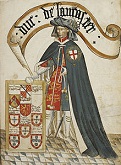


1359 On Mar. 24 John II signs the 2nd Treaty of London, surrending most of W France (the old Angevin lands), and agreeing to pay a ransom of 4M gold ecus; on May 25 the Estates General rejects the treaty and make preparations for a war with England; in Aug. Charles the Bad of Navarre reconciles with dauphin Charles and the king; Edward III arrives in Calais at the end of Oct. with a large army, but the dauphin issues a policy of avoiding pitched battles; Geoffrey Chaucer joins Edward III's army and goes with it to France; in Nov. Edward III takes Nogent-sur-Seine in Champagne, then unsuccessfully sieges Paris and king-crowning-city Reims in Dec., and Geoffrey Chaucer is captured; S France has been so devastated by the English that they have trouble finding food? - how about champagne? On Nov. 13 Ivan II (b. 1326) dies, and Dmitri (Dimitri) IV Donskoi (1350-89) becomes grand duke of Moscow (until 1389). Sultan (since 1326) Orhan I (b. 1284) dies, and his half-Greek son Murad (Amurath) (the Godlike) I (1326-89) becomes Ottoman sultan #3 (until 1389), going on to expand into Thrace, Macedonia, Bulgaria, and Serbia, establishing the core of the Ottoman Empire in Europe (Rumelia) based on tributary vassals, while Louis I the Great of Hungary counters with the Banats, border districts S of the Danube and Sava Rivers; Murad I becomes the first to take the title of Sultan of the Ghazis (warriors of the faith). Berdi Beg is assassinated by his brother Qulpa (-1360), who becomes khan of the Golden Horde until next year, when another brother assassinates him, after which the Mongol horde begins to fracture, with 23 more khans by 1378. The first Riksdag (parliament, incl. aristocrats and burghers) meets in Sweden, made possible by the whimpiness of Magnus II Smek. The principality of Moldova in the Moldova River Valley is founded, named after the hound Molda of Prince Dragos, who drowned in the river while chasing an aurochs. John of Gaunt (1340-99) marries breed mare Blanche of Lancaster (1342-68), daughter of Henry of Grosmont, 1st Duke of Lancaster (1310-61) and Isabel de Beaumont; they go on to have six children incl. Henry IV, until she dies of the plague in 1369, causing annual commemorations of her death for many years, for which Geoffrey Chaucer is commissioned to write the poem The Book of the Duchess (The Deth of Blaunche) by the end of 1368. Scottish queen Joan returns to London, living a life of courtly piety until her death in Sept. 1362, and her hubby David II takes Catherine Mortimer (-1369), wife of the earl of Fife as his mistress. Architecture: The Nave of St. Stephen's in Vienna is begun. Births: Japanese Ashikaga pretender emperor #5 (1371-82) Go-En'yu (Ohito) (d. 1393) on Jan. 11; 2nd son of Go-Kogon (1336-74); father of Go-Komatsu (1377-1433). Welsh prince of Wales (last) (1404-15) Owen (Owain) Glendower (Glyndwr) (Glyn Dwr) (d. 1416). Deaths: Greek Orthodox Hesychast theologian-monk St. Gregory Palamas (b. 1296) in Thessaloniki (d. 1357?); dies after winning a big theological debate with Italian Aristotelian scholar Barlaam of Seminara (Calabria) (Bernardo Mssari) (1290-1348) over Hesychasm, mystical contemplative prayer giving direct knowledge of God via his energies despite his essence being beyond our comprehension, with the soundbyte in "Triads for the Defense of Those Who Practice Sacred Quietude": "We attain to participation in the divine nature, and yet at the same time it remains totally inaccessible. We need to affirm both at the same time and to preserve he ntimony as a crierion for right doctrine", while Barlaam denied the distinction between God's essence and energies, claiming it impossible for humans to see God but only sense his influence indirectly, until he was condemned by an Orthodox Church council in 1341 despite support by Byzantine theologians and Thomas Aquinas disciples Gregory Akindynos (Gregorius Acindynus) (1300-48) (who was excommunicated by the Council of Constantinople in 1347), Nicephoras Gregoras (1295-1360) (who was declared heretical by a synod in 1351), and Prochoros Cydones (Kydones) (Prochorus Cydonius) (1330-69) (who was condemned by a synod in Apr. 1368 then excommunicated); after the Greek Orthodox Church makes him a saint, the split with the Aquinas-loving Latin Roman Church hardens; in 1360 the body of his anti-Hesychast rival Nicephoras Gregoras is dragged through the streets of Constantinople to jeers. Russian grand duke (1353-9) Ivan II Krasny (b. 1326).